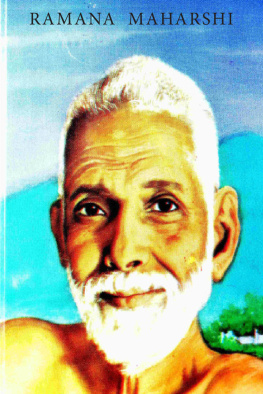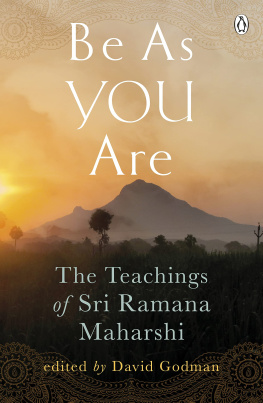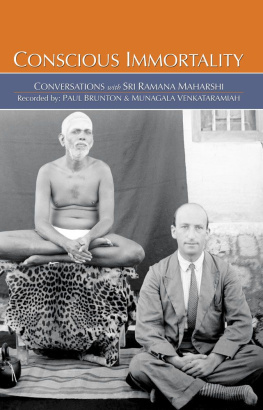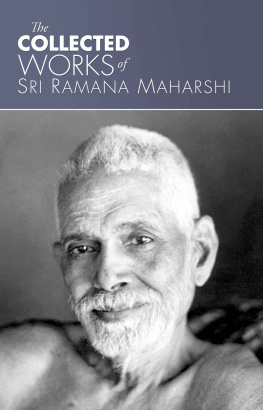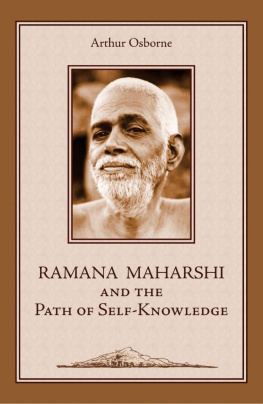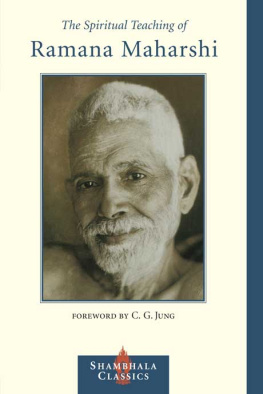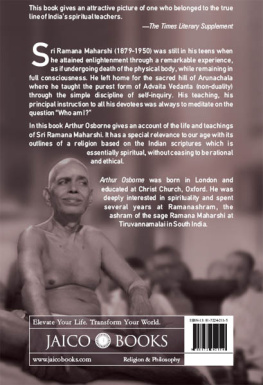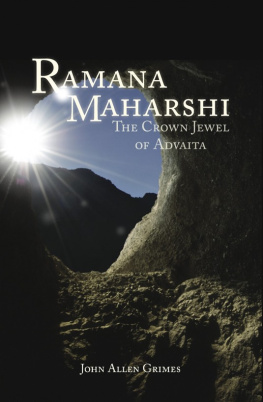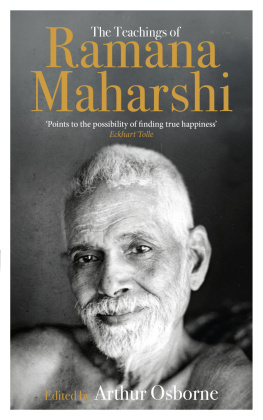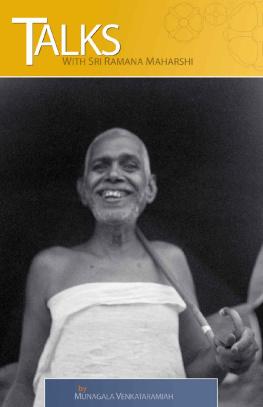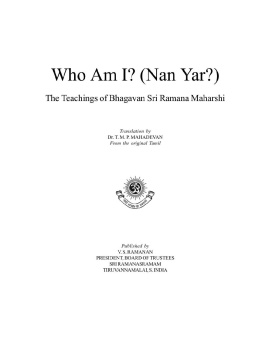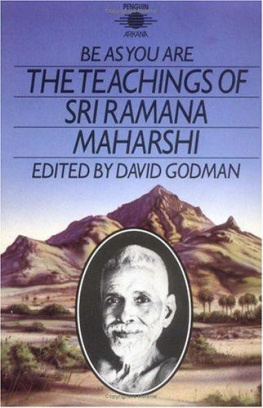Shamsa Aithala - Ramana Maharshi
Here you can read online Shamsa Aithala - Ramana Maharshi full text of the book (entire story) in english for free. Download pdf and epub, get meaning, cover and reviews about this ebook. year: 0, publisher: Rashtrottahana Sahitya Parishat Books, genre: Religion. Description of the work, (preface) as well as reviews are available. Best literature library LitArk.com created for fans of good reading and offers a wide selection of genres:
Romance novel
Science fiction
Adventure
Detective
Science
History
Home and family
Prose
Art
Politics
Computer
Non-fiction
Religion
Business
Children
Humor
Choose a favorite category and find really read worthwhile books. Enjoy immersion in the world of imagination, feel the emotions of the characters or learn something new for yourself, make an fascinating discovery.
- Book:Ramana Maharshi
- Author:
- Publisher:Rashtrottahana Sahitya Parishat Books
- Genre:
- Year:0
- Rating:4 / 5
- Favourites:Add to favourites
- Your mark:
- 80
- 1
- 2
- 3
- 4
- 5
Ramana Maharshi: summary, description and annotation
We offer to read an annotation, description, summary or preface (depends on what the author of the book "Ramana Maharshi" wrote himself). If you haven't found the necessary information about the book — write in the comments, we will try to find it.
Ramana Maharshi — read online for free the complete book (whole text) full work
Below is the text of the book, divided by pages. System saving the place of the last page read, allows you to conveniently read the book "Ramana Maharshi" online for free, without having to search again every time where you left off. Put a bookmark, and you can go to the page where you finished reading at any time.
Font size:
Interval:
Bookmark:
RAMANA MAHARSHI
RAMANA MAHARSHI
BY
SHAMSA AITHALA
ePublished by Litent
www.litent.com
Rashtrotthana Sahitya
Introduction
A great soul, he left home in boyhood seeking Knowledge and Peace. Ramana Maharshi was full of compassion for all living beings. He became a kindly light to all who came to him seeking peace of mind.
The sacred land of India (Bharat) has given birth to many great men and women. From the time of the Vedas to the present day, many Rishis, Seers and Saints have been born in this country.
Some of them, living in the forests, performed severe Tapas (meditation on Gods), sought Truth, and attained Knowledge; they helped the spiritual progress of the world. Some others dedicated their lives to the service of the people and the country; they lived with the people and shared their life. They have contributed to social progress. Ramana Maharshi is a great man who belongs to the latter category.
Kumbhakarna
Ramana Maharshi was born in 1879. There is a smal vil age, thirty miles from Madurai, in Tamilnadu. The name of the village is Tiruchuli.
The village has a small temple. In a house close to the temple lived a couple called Sundaram Iyer and Alagammal. They were an ideal couple.
Both the husband and the wife were God
fearing and kind hearted. The couple had three sons. Venkata- Ramana was the second among them. He was born on December 30. It was the day of the Jatra (the Vil age Community Festival).
There was nothing remarkable in the early life of Venkataramana. He grew up like other boys.
His elementary education was completed in the vil age school. When he was twelve years old, his father Sundaram Iyer passed away. Alagammal had to leave the village, go to Madurai with her children, and live with Subba Iyer, brother of Sundaram Iyer. Venkataramana joined the Mission High School and continued his education.
Venkataramana showed no interest in the lessons. He was very lazy. It used to be a task for his mother to send him to school each day. But the boy kept radiant health. His classmates were afraid of him. He was very strong. One interest-ing thing about him was his deep slumber. He used to sleep so soundly that he would not be awakened even by any thing his friends did to him -if they beat him or carried him to some other place and left him the he would not wake up. He was fitting nick named Kumbhakarna
(brother Ravana, the King of the Rakshasa in to Ramayana; Kumbhakarna slept sound for months).
'Arunachala
Who ever -knew that this boy would become a saint some day? But many of the important events in life come about by chance. Venkataramana became a saint how did it come about?
When the boy was sixteen years old, one day a guest came to the house of Subba lyre. He was asked where he came from. He replied, From Arunachala. The word attracted Venkataramana
curiosity. He asked: Was it from Arunachala you came? Where is it? The guest replied: Tiruvannamalai itself is Arunachala. Something attracted the boy. He made up his mind then and there that he should visit Arunachala once. One of the Tamil poems that he had read was Kulothungas Periya Purana. The stories relating to Shaiva saints narrated in it left a deep impression on his mind. The example of those saints produced a strange effect on the Wart and mind of the boy. How I wish that I could also become one like them! so he yearned.
From that very day he commenced solitary, silent meditation on God.
The Body Is Not I
It was the middle of the year-1896. Venkataramana was only seventeen years old. One day, as usual, he was in the first floor of his uncles house, in a mood of deep thought. His health was good. But all of a sudden, he was seized by the fear of death. He felt he was almost dying.
Trying to prevent this feeling from weakening him, he began to think of what he should do. He said to himself:
Now death is approaching. I am dying. What is death? This body gets lost.
Then he held his breath completely, closed his lips and eyes, lay down as one dead, and began to ponder:
Now my body is dead. They will carry this body, motionless, to the cremation ground and burn it. But do I really die with this body? Am I merely this body? My body is now motionless.
But stil I know my name. I remember my parents, uncles, brothers, friends and all others. It means that I have knowledge of my individuality. If so, the I in me is not merely my body; it is a death-less spirit.
Thus, as in a flash, a new realization came to Venkataramana. His thoughts may seem boyish fancy. But one thing must be remembered. Usually a man wins God realization by perform-ing tapas for years and years, without food and sleep; he subjects the body to great suffering.
But Venkataramana won the highest knowledge without al these. The fear of death left him. Venkataramana became Ramana Maharshi.
Studies at school, relations and friends none of them seemed important to him, He ever dreamed of Arunachala. He spent the greater part of the day in solitary meditation. He tried to escape from surroundings, and to grow in soli-tude. Away from friends he would seek a lonely place. It became difficult for his mother to find him and bring him home for food. Every day Venkataramana visited the Meenakshi temple.
His interest in Gods and saints grew deeper.
His brother observed all these changes in his behavior.
The Boy Leaves Home
It was the 29th of August 1896 weeks had passed since his strange experience. He did not answer a question in the English class. So the teacher asked him to copy some passages from a text book of grammar three times. The boy wrote two times and then stopped. Understanding the uselessness of what he was doing, he threw aside the book and pen, and entered into meditation in the classroom. The teacher also saw it.
What could he do with such a queer boy? The teacher sat dumbfounded.
Venkataramana resolved to go to Arunacha-lam. If he had informed the elders at home, they would certainly not have given him permission.
Therefore, the only way open to him was to run away from home without anybodys knowledge.
He looked into the map and located the rail-way station near Tiruvannamalai. He needed three rupees to reach the place. The same day his brother had received five rupees from his mother to pay his (the brothers) col ege fees; he gave the money to Venkataramana, and asked him to go to the college and pay it. But Venkataramana told his people that he had a special class and left home that afternoon. Before leaving, he addressed a letter to his brother, which ran as follows:
I have left to seek lather. Nobody needs worry about me. No money need be spent to search for me; no one should try to find me. I have not paid your col ege fees. I have taken three rupees out of the college fees, and the balance of two rupees is with this note.
When Venkataramana left home, it was afternoon. He went straight to the Railway Station.
Fortunately the train arrived late that day. Oth-erwise he could not have traveled that day. He bought a ticket for two rupees and thirteen annas (one anna is roughly six paise); he stil had three annas.
The Journey
Venkataramana boarded the train and sat in a corner. He had no desire to speak with anybody.
But a Maulvi Saheb who sat beside him began a conversation. It was from him that Venkataramana learnt that it was possible to go upto Tiruvannamalai by train. As he had already bought a ticket, this information was of no use to him.
He was hungry. He bought some fruits for half an anna and ate them.
Early next morning he reached Viluppuram station. He had decided to walk the distance to Tiruvannamalai. He was very tired. He was hungry also. He entered a hotel on the way, and asked
-if food was ready. He had to wait a long time for food. After food, he paid two annas to the owner of the hotel. But the owner asked him how much many money he had. The boy answered, Two and a half annas. Probably the owner felt sorry for him. He did not take any money from him. He also listened to the boys tale and suggested that it was better to reach Tiruvannamalai by train.
Next pageFont size:
Interval:
Bookmark:
Similar books «Ramana Maharshi»
Look at similar books to Ramana Maharshi. We have selected literature similar in name and meaning in the hope of providing readers with more options to find new, interesting, not yet read works.
Discussion, reviews of the book Ramana Maharshi and just readers' own opinions. Leave your comments, write what you think about the work, its meaning or the main characters. Specify what exactly you liked and what you didn't like, and why you think so.

